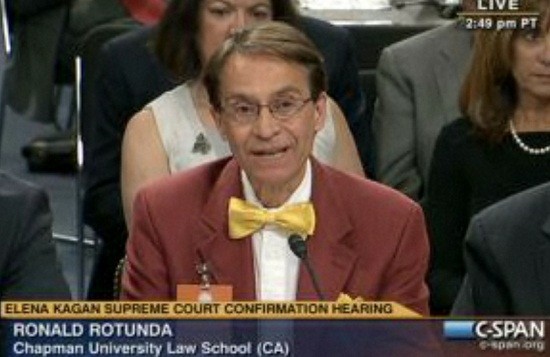
]
OC Weekly (Spencer Kornhaber): I want to ask you about Orly Taitz.
There's some people who say that both parents need to be citizens. That's never been the law…What they [the founders] were thinking about at the time was they were just concerned about foreigners coming in. But that's not what we've got here. So I think she's grabbing whatever straw she can, and I happen to be a straw.
I take it you came to this answer, as Orly Taitz thinks, only after Obama's thugs got to you?
Nobody talked to me, thug or otherwise. Nobody called or anything like that. [chuckles] I guess I'm just not important enough to be gotten to. I don't know how you get to me anyways. I guess she knows more than I do. I never met the woman, she just asked for some election lawyers and I gave her some names. And I tried to be pleasant. And I haven't looked at her website. But a couple people told me she thinks we're best buddies, and that's news to me. I don't know the woman, I just have nothing to do with this.
The Facebook message she posted on her blog said you voted for her. Did you?
I heard of her–I'm trying to be polite–I heard of her name when I voted, I don't remember voting for her. Let me be very precise: I would not recommend anybody votes for her. If anybody cares about my endorsement, I guess you'd call it an anti-endorsement.
She seems to be obsessed about this, and it's a free country, people can be obsessed. I'm just a straw that she's grasping. She's lost all these cases. You can't lose that many cases if you've got a valid position. I just don't think it's valid.
I want to ask you about something the birthers talk about, they point at Emmerich De Vattel's The Law of Nations—
I'm sorry, the what?
The name is D-e V-a-t-t-e-l–
I've heard the title of the book, I can't spell the name. Anyway, what about it?
They argue that books like this mattered a lot to the founders when they were writing the Constitution. Does that ring true?
I don't remember, what is their argument?
That to be natural-born citizens, your parents have to be citizens.
Actually, I just did an op-ed about this for the Chicago Tribune… Chief Justice Marshall talks about this in early opinions. He basically had the view that Congress could grant citizenship but never take it away. Then Dredd Scott came down and the Supreme Court said over a bitter dissent that the freed man, they said negroes–we call them blacks now–but negroes, even freed, can in the nature of things never be a citizen of the United States. Well this surprised a lot of blacks, particularly those who fought in the revolutionary war on the side of the United States. And so after the civil war, Congress proposed the 14th Amendment, the first sentence of which says all persons born or naturalized in the United States are citizens of the United States and the state in which they reside. That was to make sure that these people, Congress could never take away their citizenship.
In a series of cases, the court has said that if you're born in the United States and subject to the jurisdiction, you're a citizen. And subject to the jurisdiction doesn't mean subject to allegiance. It's subject to jurisdiction–that is, you're here, they can control you. Now the people that aren't subject to our jurisdiction, the court said in the old cases, are foreign embassy personnel, they've got diplomatic immunity and so on. So that the wife of the Russian ambassador–her kid, even if it's born in a New York hospital, or a DC hospital, isn't a US citizen. And the other category they had was an invading army, a marauding army comes in and has babies, they're not citizens, they're not subject to our jurisdiction, they're fighting us. And then also they talked about American Indians because they had treaties with them, they were called domestic dependent nations and we had treaties with them and then Congress gave them all citizenship by statute.
And the court has said you just can't take away citizenship unless you procured it by fraud. So it doesn't matter that only one of the people is an American citizen, I guess the mother and not the father. In fact, if they're born in the United States, like Hawaii, then it doesn't matter that either one is not a citizen. So she makes her argument–the court's rejected it.
It was pretty clear what the framers wanted. They wanted to make sure that citizenship is not something that could ever be taken away if you've been born or naturalized in the United States. If you've been naturalized in the United States and then commit treason, they can prosecute you for treason, they can execute you for treason. Some people say they should take away your citizenship because of that. Well they can't do that and they don't realize that if they take away your citizenship it's no longer treason so they can execute you for that, for being treasonous.
So her argument–if the father is Indonesian or Kenyan or whatever he is, the mother is a US citizen–but whatever happened to the two of them, he was born in Hawaii, that's what the birth certificate said. So, it's a free country, birthers can do what they want, but there's no squirrel in the tree they're barking up, as best I can tell.

